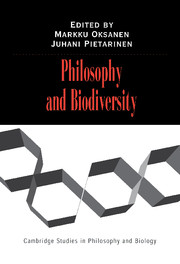Book contents
- Frontmatter
- Contents
- List of Figures and Tables
- List of Contributors
- Acknowledgements
- Philosophy and Biodiversity
- Part I USING ‘BIODIVERSITY’
- Part II UNDERSTANDING BIODIVERSITY
- Part III VALUING BIODIVERSITY
- 6 Jean-Jacques Rousseau
- 7 There Is Biodiversity and Biodiversity
- 8 Evaluating Biodiversity for Conservation
- 9 Limits to Substitutability in Nature Conservation
- Part IV PROTECTING BIODIVERSITY
- Index
- References
7 - There Is Biodiversity and Biodiversity
Implications for Environmental Philosophy
Published online by Cambridge University Press: 26 June 2009
- Frontmatter
- Contents
- List of Figures and Tables
- List of Contributors
- Acknowledgements
- Philosophy and Biodiversity
- Part I USING ‘BIODIVERSITY’
- Part II UNDERSTANDING BIODIVERSITY
- Part III VALUING BIODIVERSITY
- 6 Jean-Jacques Rousseau
- 7 There Is Biodiversity and Biodiversity
- 8 Evaluating Biodiversity for Conservation
- 9 Limits to Substitutability in Nature Conservation
- Part IV PROTECTING BIODIVERSITY
- Index
- References
Summary
This chapter argues that biodiversity is what may be called a secondary, rather than a primary, ontological characteristic – a distinction that is borne out and required to be made by the increasing ability on the part of humankind, through the technology of genetic engineering, in principle, to create new organisms with genetic material belonging to a very different species inserted into their genome. If biodiversity per se is either only of instrumental value or is a mere secondary characteristic, then such human ingenuity in manufacturing its own biodiversity would not be troublesome. But if nature's biodiversity, as an expression of nature's own creativity, is a primary, ontological characteristic, then the displacement or transcendence of naturally occurring biodiversity by humanly fabricated biodiversity would be philosophically troublesome. However, this should not be misinterpreted to imply that no powerful instrumental reasons for caution about humanly fabricated biodiversity exist. Clearly, they do. However, it is not the objective of this contribution to demonstrate these more familiar worries and concerns. Instead, the focus is on the less commonly articulated ontological objection to the loss of naturally occurring biodiversity. But the point made presupposes the related distinctions between human and nonhuman, on the one hand, as well as between nature and culture on the other.
BIODIVERSITY: ITS COMPLEXITY
“Biodiversity” as a term refers to a complex set of phenomena, as biodiversity takes more than one form.
- Type
- Chapter
- Information
- Philosophy and Biodiversity , pp. 152 - 171Publisher: Cambridge University PressPrint publication year: 2004
References
- 3
- Cited by



